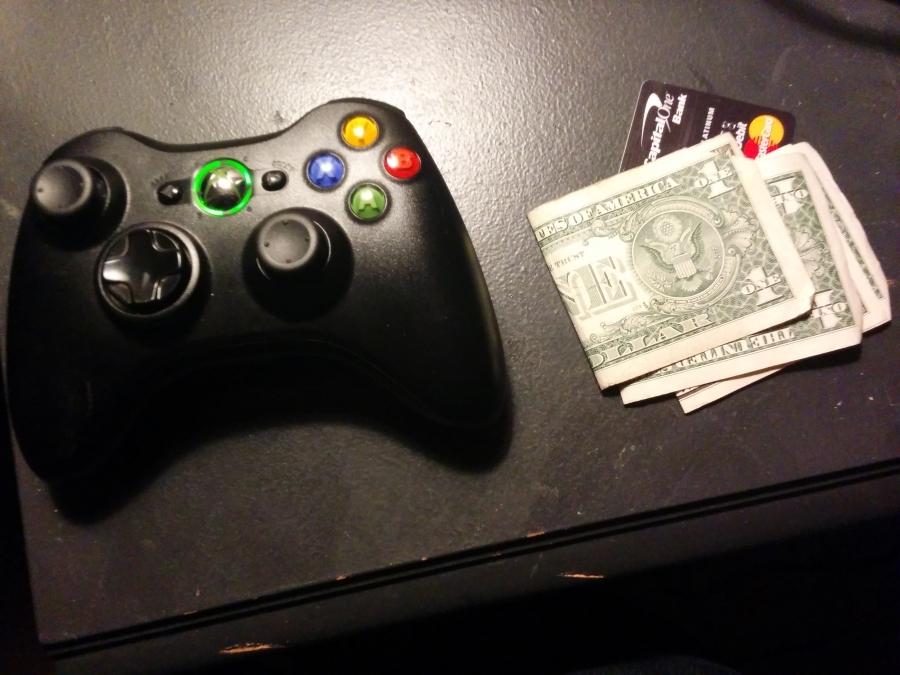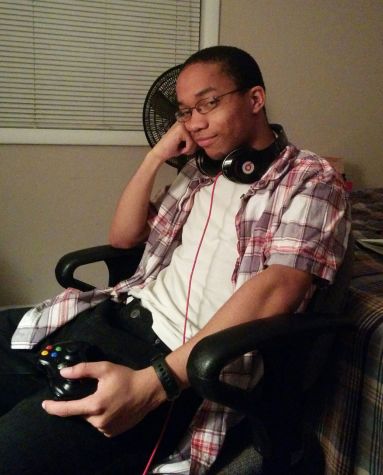Is Gaming Just A Money-Grab?
January 12, 2015
When you ask any videogame player what really grinds their gears, they will usually give you one of two answers in general: either the gameplay is underwhelming for whatever reason, or the game’s business model is putting some serious hurt on their wallets.
With all the resources available to them, you’d think that game developers and publishers would work to deliver their best product when the game is released to the public. But over time, the games have been getting shorter, less robust, and have been quietly demanding more and more money from their players, sometimes even before the games are playable. It’s a worrying trend that won’t be coming to an end as long as the fan base remains oblivious.
The glaring problem with throwing money at a game before the release is that once the developers and publishers have your money, they’re often not incentivized to continue working to produce the highest quality product come launch day. They’ll just throw the money into their bank accounts and let it collect interest. Even if a fraction of the players do demand a refund, the companies still make a profit off of interest.
Many games now also come with preorder exclusives that cannot be returned once used, voiding any possible refund. The end result is an embarrassing, slipshod release for a multi-million dollar “blockbuster.” A few major releases to disappoint in recent months include Assassin’s Creed Unity, Destiny, and Halo: The Master Chief Collection.
A lot of the pre-release hype also comes from advertisements and conventions which show off all of the best features of a game — features which may not even make it into the final product. “I don’t play games myself, but I have to say Call of Duty really got my attention because of the commercials,” says our librarian Ms. Collins. Others like senior Orlando Rivera believe that, “[they] divert funds from actually developing the game when you could technically advertise for free by letting popular YouTube celebrities review beta builds for you.”
Fast forward to the proper release of the game. The community has set the forums aflame with all their objections, and the developers are hopefully scrambling to meet everyone’s demands, while the publishers continue to rest on their laurels, counting our cash. Fans are going to perform an about-face in a hurry and go spend their money elsewhere, unless they are encouraged to come back. Enter a variety of purchasable add ons and exclusive content. This is a fairly broad area, but the gist of it is that you can pay extra for additional content. This is often used in conjunction with promotional content to give the player base a drip-feed of new content to play. In its most outlandish form, this is used to sell back “exclusive content” that has been locked away inside the game. Meanwhile, in “free to play” games a common ailment known as “pay to win” occurs when an element purchasable with real cash can ensure you have the best game experience possible, while everyone else suffers.
“This hasn’t been a good year for gaming. Developers and publishers need to stop cutting things from the game for DLC (Down-Loadable Content). If you want my money, make new content. The industry should be ashamed,” says senior Moses Washington, who plays (and pays for) Xbox and PC games.
A broad mix of gamers and non-gamers are in almost universal agreement regarding the rehashing and resale of content already within a game. Almost.
“I think preordering is a great concept; it shows how popular a product will be, but I’ve always had a problem with additional paid content. It feels as if they have all the content ready for release, but they cut out specific elements to sell back to you at a later date,” advocates Mr. Harris, the school’s science department head.
2014 came to an end with a slew of disappointing releases, with many more on the horizon. Action needs to be taken against ulterior motives such as these, but this is a two-man operation. The consumers need to come to grips with the fact that throwing money at a game before they truly understand what they’re paying for will not give them the power they want over the developers and publishers.
Likewise, the creators need to understand that the community is all too willing to throw exorbitant amounts of cash at a game that it loves, but having them do so and then under delivering will make it much harder to do so in the future, until the community becomes too spiteful to trust anything that comes from a certain developer/publisher.
Gaming has the unique potential to become the foremost media industry in the world, as long as the two factions can find a middle ground. If not, the gaming bubble may burst.





Arti Shala • Jan 19, 2017 at 9:07 am
Just play on PC, it might cost more to make a PC but you get much more use out of it then a console and I have over 200 games and I’ve only spent about $200 total on games, many of my games are AAA titles too. I’d advise you to join the cult.
MadeThatWay • Jun 12, 2015 at 5:02 am
You speak the truth in this article. However, valid and radical solutions aren’t discussed and I think they should be, because really, we’ve all done our fair share of whining and complaining, haven’t we?
The major problem is the whole capitalist system, which is – quite blatantly – a pyramid scheme. Remove that, and things begin to get better for everyone and games – for instance – suddenly become a whole lot more fun and financially reasonable.
By way of example, let’s take the Mondragon model in the Basque region of Spain – where the workers own their jobs. There’s no rich and poor there – everyone lives a middle class lifestyle and it’s easily seen driving down the streets – there are no mansions on one side of the street with slums on the opposite side – all are, as I’ve said, middle class. Capitalist oppression just doesn’t exist there.
That can only come from a one person, one vote system, where everyone owns their place of employment and everyone has an equal voice in the decision making, what’s produced and how it’s produced, marketed and distributed – no one has more of a say than any other, surpluses (aka ‘profits’) are shared equally among the worker-owners after expenses each year and there’s no greedy fat cats (CEO’s) at the top and no greedy bottom-feeding shareholders.
That system has worked well in Mondragon for almost 60 years. No one is ever been unemployed. Not even with the financial climate of 2008 – they weathered that storm together and despite them having to close the Fagor factory because of the capitalist system’s crash causing the lack of demand for Fagor appliances, not one person lost their job. Not one.
I know all that would seem to sound irrelevant to the gaming community, but actually, it’s not. It’s entirely relevant. It’s relevant to any industry you can think of.
Implementing the Mondragon system would bring a decided and much needed end to the current oppressive, pyramid-scheme, Capitalist system.
With each worker also being an equal owner and decision maker, quality suddenly sky-rockets while expenses are able to be kept low and therefore the finished product is able to be offered at a reasonable price – no more scams like in-game currency being bought for real world money with the current ‘to-hell-with-quality-we-want-insanely-bigger-profits’ syndrome.
Conor McCormick • Feb 3, 2015 at 10:57 am
This article is right mostly and its wrong to generalize all games in general.For example mostly EA and ubisoft have been screwing things up. I.E (titan fall being pushed before being finished, AC unity bugs that where never fixed, drive club pay to play shame) other games such as indies mostly have turned out very well recently. Mostly tho preorders and dlc have destroyed games and made them almost unplayable unless you cough up more money.
Samy • Jan 29, 2015 at 10:22 am
Although I do enjoy playing my video games on my Play Station 4, I have to agree with you Brandon. Video games cost a lot these days. $400 for a console like the PS4 and then $60 per game. In addition to that buying an extra controller to play with friends or sibling it an extra $60. Lastly if you want to play online with your friends and random people then you have to pay another $50 per year. Playing video games is really enjoyable to me and it’s thing to do if you want to relax at home. Lowering the prices for games and extra accessories would certainly make it more attractive.
Bruno • Jan 29, 2015 at 10:15 am
I agree with Joseph all the games he’s said are great. Although i believe that games should be on a regular basis, $40 not $60.
Joseph • Jan 13, 2015 at 7:05 pm
I have to disagree with you on several points.
Assassin’s Creed Unity, Destiny, and Halo: The Master Chief Collection have not been considered disappointments.
Metacritic Scores:
Assassin’s Creed: Unity: 73
Destiny: 76
Halo: The MCC: 86
In gaming reviews, these are considered average to above average scores, especially Halo.
Also, where is your source that video games are getting shorter and less robust? Do you have any sources to back up your claim?
Lastly, Wakefield’s teachers a great but are they really experts on video games?
adviser • Jan 13, 2015 at 8:45 pm
Wow! Put your money where your mouth is and write an article…if you are a Wakefield student. (For Wakefield students, by Wakefield students)
Brandon Carpenter • Feb 3, 2015 at 10:35 am
In retrospect you’re right about the citations, I didn’t include any, and I should probably elaborate on the good aspects of these marketing strategies. But I have to point out that reviewers have a pedigree of giving games poor reviews because it doesn’t blow their minds within something like 15 minutes of gameplay. If I told you to watch 5 minutes of the first episode of an anime you’d probably give me a lackluster review too.
The communities for Halo/Destiny and Assassins Creed consider the most recent entries to be major disappointments, if not outright failures at launch, while reviewers are shown the most polished bits for as long as it takes to get them hype. Then they leave to go write a glowing review while the press demo falls apart.
Just my two cents.